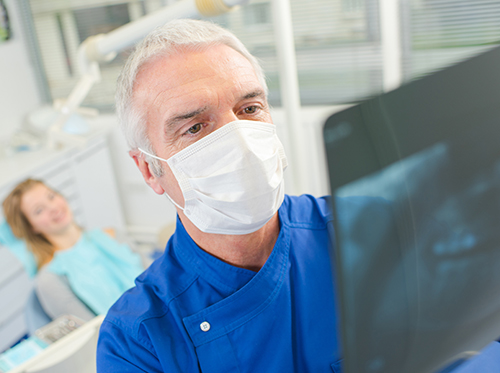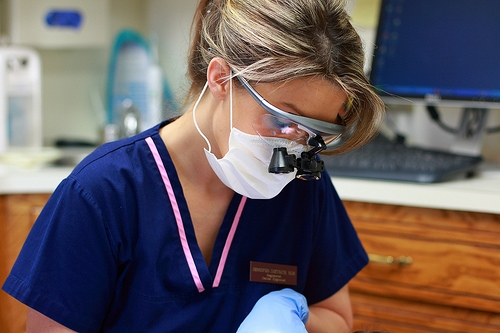
If you snore, you know it can be an annoying disruption during an otherwise good night’s sleep. For many of us, changing sleep positions, on our own, or thanks to a loved one’s gentle prompting—or unhappy elbow—takes care of the problem. But snoring can be a symptom of a potentially serious medical condition. Let’s take a quick course in sleep apnea.
Is It Snoring or Sleep Apnea?
Both snoring and sleep apnea result from obstructions in your airway as you breathe during sleep. Soft tissues relax in the throat area, partially blocking the airway, and vibrate with the passage of air. This vibration causes that distinctive snoring sound. But sleep apnea is more than just noise caused by vibrating tissue.
The word “apnea” is derived from the Greek word for “breathless.” If you suffer from sleep apnea, you actually stop breathing during sleep for a brief time, often choking or gasping for breath. Your body responds by waking every time you need to start breathing properly again, and this can happen dozens of times each hour you are asleep. While you may think you have slept through the night, you have never gotten the deep sleep your body needs to restore itself.
What Are Some of the Consequences of Sleep Apnea?
You’re probably well aware of the nighttime miseries of sleep apnea. But this condition can also impair your health and quality of life during the day. Sleep apnea sufferers often experience:
- Constant drowsiness
- Falling asleep at work or while driving
- Morning headaches
- Sore throat
- Dry mouth (which can lead to gum and dental problems)
- Memory and attention problems
- Moodiness or depression
- Decreased libido
As if these reasons weren’t cause enough to find a solution to your sleeping disorder, the longer term results of sleep apnea can be devastating. Many serious conditions and consequences have been linked to sleep apnea, including:
- High blood pressure
- Heart disease
- Stroke
- Dangerous reactions to medication
- Problems with general anesthesia
- A higher risk of accidents
What Causes Sleep Apnea?
Sleep apnea occurs in three forms:
This is the most common form of sleep apnea. It can be the result of the muscles in the back of the throat relaxing during sleep to obstruct the airway. Obstruction can also be caused by a physical condition such as a deviated septum, excess throat tissue or enlarged tonsils.
Central sleep apnea is caused by the brain failing to transmit the proper signals to breathe during sleep. The sleeper either stops breathing, or takes such shallow breaths that he or she can’t get enough air into the lungs.
This condition is a mix of both obstructive and central sleep apnea.
What Kind of Treatments Are Available?
Many treatments, ranging from behavior modification to surgery, have proven successful in providing patient’s with a better night’s sleep.
- Behavior modification—Losing weight, abstaining from alcohol, even changing your sleep position can be effective in mild cases.
- Oral appliances—These specially-fitted devices, which resemble mouthguards, can advance the jaw or hold the tongue forward to maximize airway space as you sleep.
- Positive Airway Pressure (PAP) machines—For those with moderate to severe sleep apnea, PAP machines, which provide pressurized air through a tube attached to a mask, deliver a gentle flow of air to keep airways open.
- Surgery—There are several different surgical procedures used to treat obstructive sleep apnea, depending on the cause and location of the obstruction.
These and other options might be recommended based on the reasons for and severity of your sleep apnea. An oral and maxillofacial surgeon like Dr. Movahed is uniquely qualified to provide an expert diagnosis of your condition and to recommend the most effective treatment for your sleep apnea, whether surgical or non-surgical.
Why an Oral Surgeon?
Oral and maxillofacial surgeons are dental specialists. They pursue a minimum of four years of additional advanced studies in a hospital-based residency program, where they train with medical residents in the fields of general surgery, anesthesiology, internal medicine, and other specialties with a specific focus on the bones, muscles, nerves, and skin of the face, mouth, and jaw.
Oral and maxillofacial surgeons have the skill and experience to diagnose the often complex causes of sleep apnea, based on a careful analysis of each individual patient’s unique throat, nose, and jaw structures, airway flow patterns, and potential breathing obstructions as the air moves from nose to lungs.
After taking your medical history and performing a careful examination of your head and neck, Dr. Movahed might recommend a sleep study where your sleep patterns will be monitored and evaluated. If a sleep disorder is diagnosed, you and your surgeon can decide on the best course of treatment.
Now that you’re up on the basics of Sleep Apnea 101, if you suspect that you might be suffering from sleep apnea, make an appointment at our O'Fallon, IL; Columbia, IL office. It’s time to graduate to a restful, healthy night’s sleep!





































